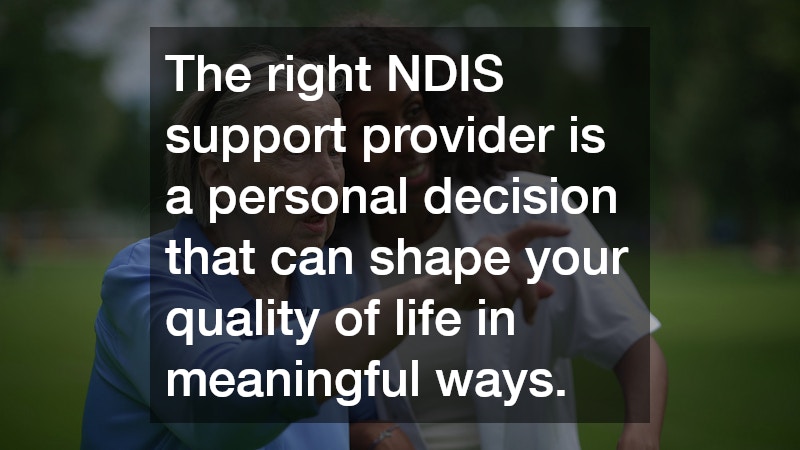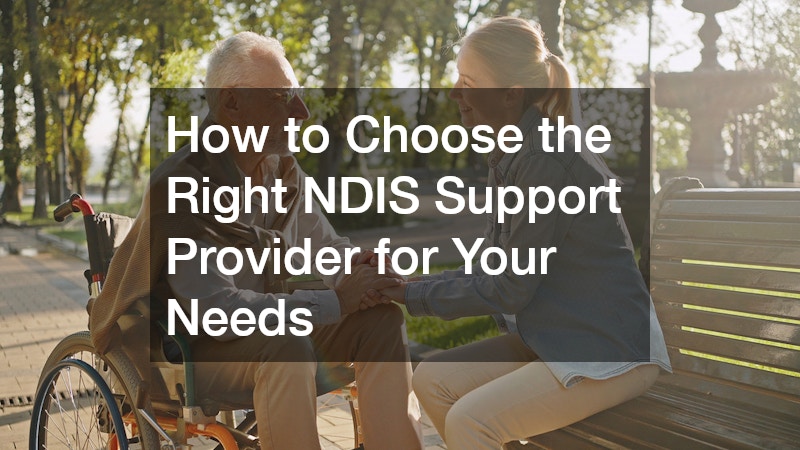Finding the right NDIS support can make a big difference in how effective and comfortable your plan feels day to day. Whether you’re new to the National Disability Insurance Scheme or reassessing your current services, choosing the right provider is a key step in reaching your personal goals and living more independently.
Understanding Your Needs First
Before selecting a provider, it’s important to be clear about what kind of support you need. This includes everything from help with daily living tasks to therapy services, employment support or social participation.
Each participant’s plan is different, and understanding your own goals helps you narrow down the list of providers who offer what you’re looking for.
NDIS support should align with your short-term and long-term goals. Consider if you need support workers daily, occasionally or just for specific tasks. Some participants also look for providers who are flexible with schedules or able to deliver services at home, online or in community settings.
Registered vs. Unregistered Providers
One of the first decisions to make is whether you want to work with a registered NDIS provider. Registered providers meet the strict requirements set by the NDIS Quality and Safeguards Commission. These include training, background checks and ongoing compliance. Choosing a registered provider gives many participants peace of mind, especially when managing more complex needs.
However, if you’re self-managing your NDIS funds or using a plan manager, you’re also allowed to access unregistered providers. This opens up more choice, especially in rural or remote areas where fewer registered providers operate. Whichever route you take, make sure the provider has the right experience, qualifications and reputation for the type of NDIS support you need.
Reputation and Reliability Matter
It’s essential to do your homework before committing to any provider. Start by reading reviews, checking testimonials or speaking with others who have used their services. Good NDIS support providers communicate clearly, show respect and are responsive when issues arise.
You can also ask potential providers about their experience working with people who have similar goals or challenges to yours. A strong provider will tailor their approach to suit your individual preferences rather than using a one-size-fits-all method. Make sure to ask about backup plans, too, in case a staff member is sick or unavailable.
Reliability is especially important when you depend on the provider for daily support. Missed appointments or a lack of communication can affect your well-being and routine. A trial period or initial meeting can help you assess if the provider meets your expectations.
Checking Compatibility and Communication Style
The working relationship between you and your NDIS support provider plays a big role in how satisfied you’ll feel with the service. Take note of how well the provider listens, how they answer your questions and whether they’re open to feedback. You should feel respected and heard.
It’s also worth considering how staff are selected and trained. Some people prefer to be matched with support workers who share similar interests, cultural background or gender. A good provider will try to meet your preferences and ensure staff understand how best to support you.
Clear communication is a strong indicator of professionalism. From booking appointments to providing progress updates, you want a provider who is consistent and easy to deal with. Regular check-ins, written summaries or digital tracking tools can help you stay informed and in control.
Flexibility and Future Planning
Your needs may change over time, and your NDIS support provider should be flexible enough to adapt. This could mean offering additional services, changing the way support is delivered or helping you transition into new life stages, such as employment or independent living.
Talk to your provider about how they manage changes to support plans or hours. A good provider will help you navigate reviews and offer suggestions if your goals shift. They should also be proactive in helping you make the most of your funding.
Choosing a provider that offers a broad range of services can also be beneficial. It may allow you to access therapies, employment coaching or community participation from one place, which saves time and improves continuity.
Selecting the right NDIS support provider is a personal decision that can shape your quality of life in meaningful ways. Look for someone who listens, communicates clearly and offers the specific support you need, in a way that respects your goals and preferences.
Take your time, ask questions and don’t be afraid to change providers if the fit isn’t right. Your plan is about you, and the right provider will always put your needs at the centre of their service.
With careful research and open communication, you can find an NDIS support provider who helps you feel empowered, respected and well-supported throughout your journey.

